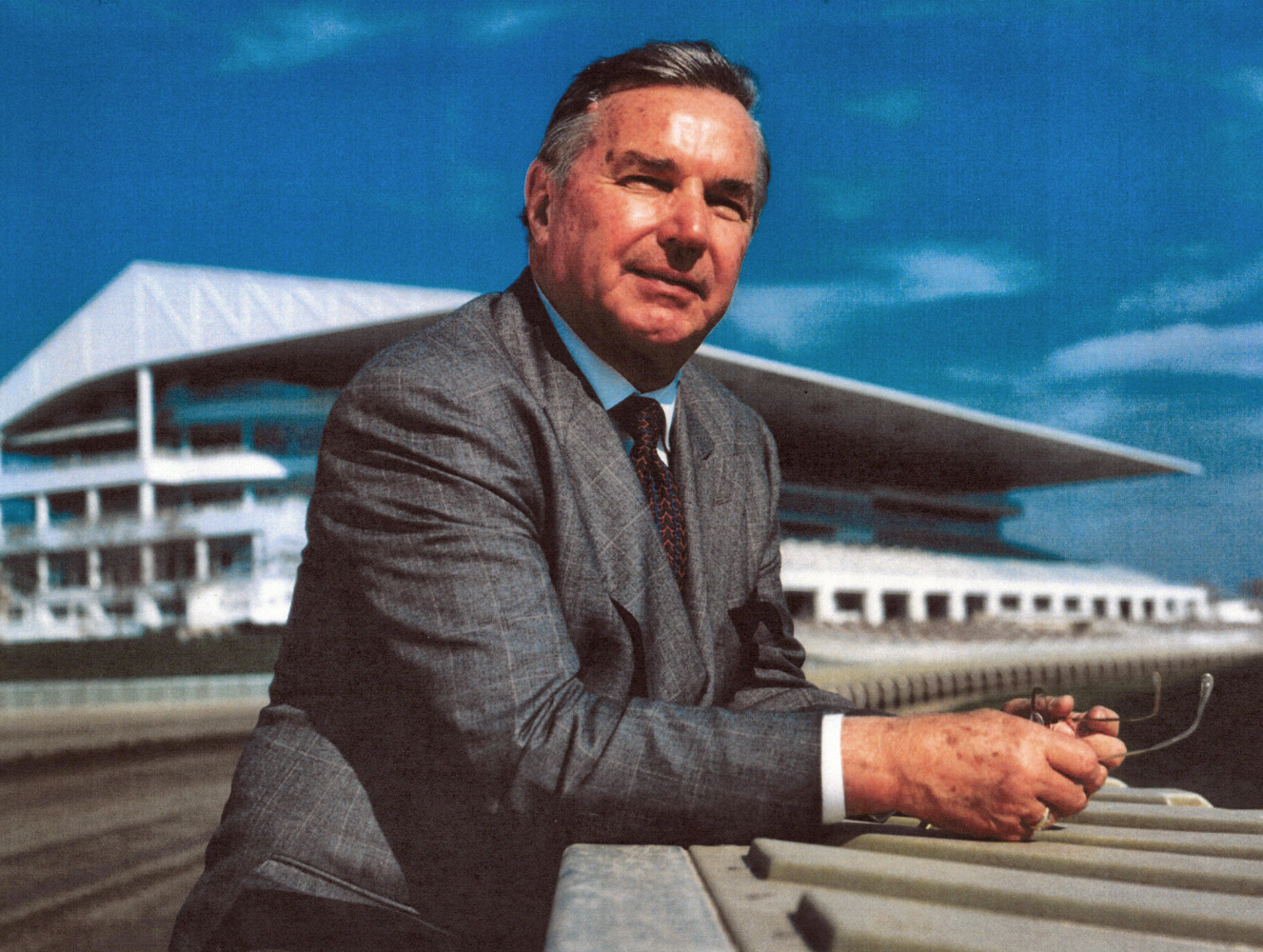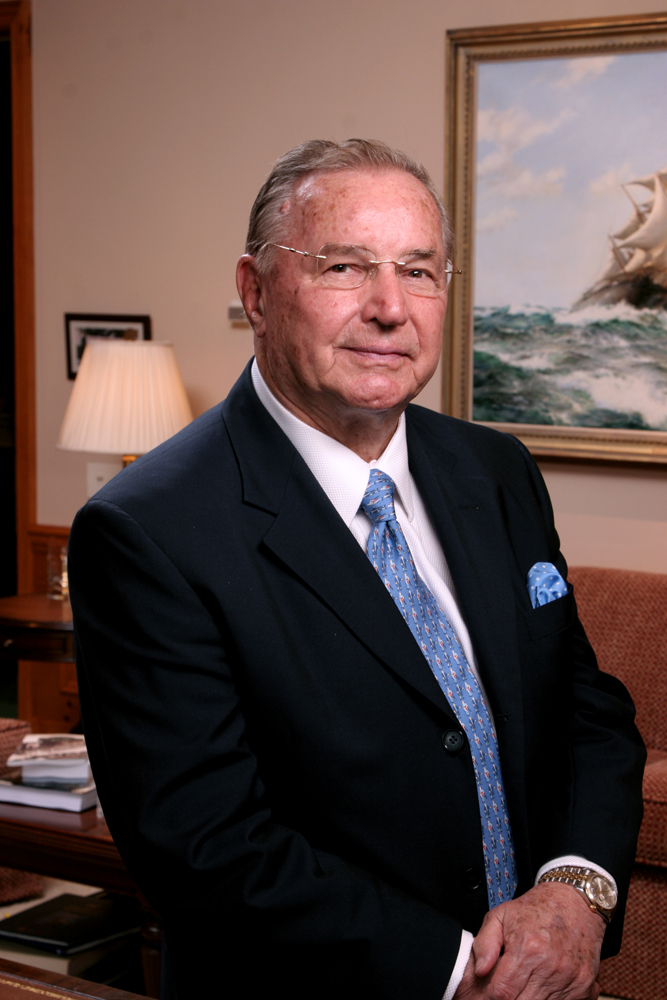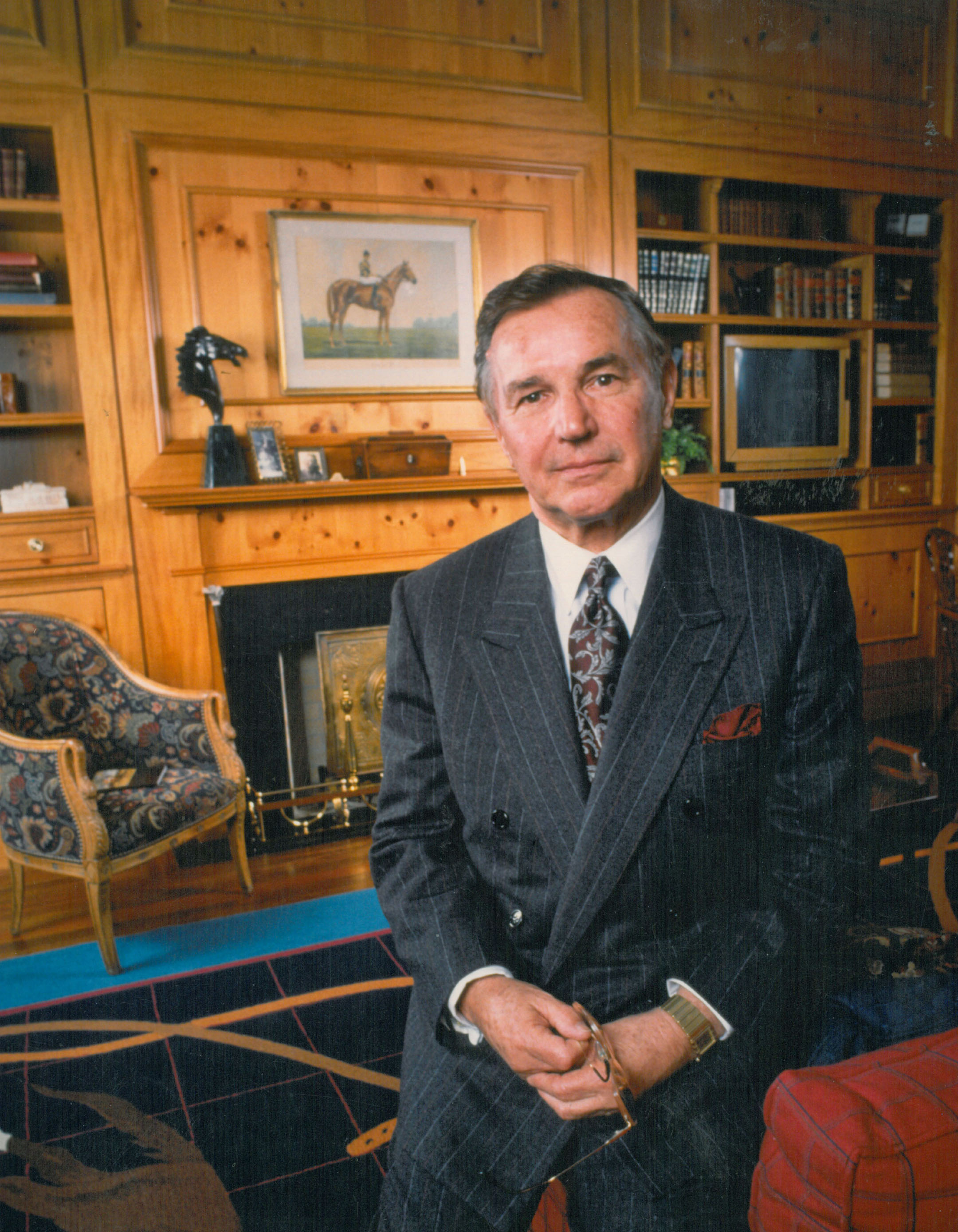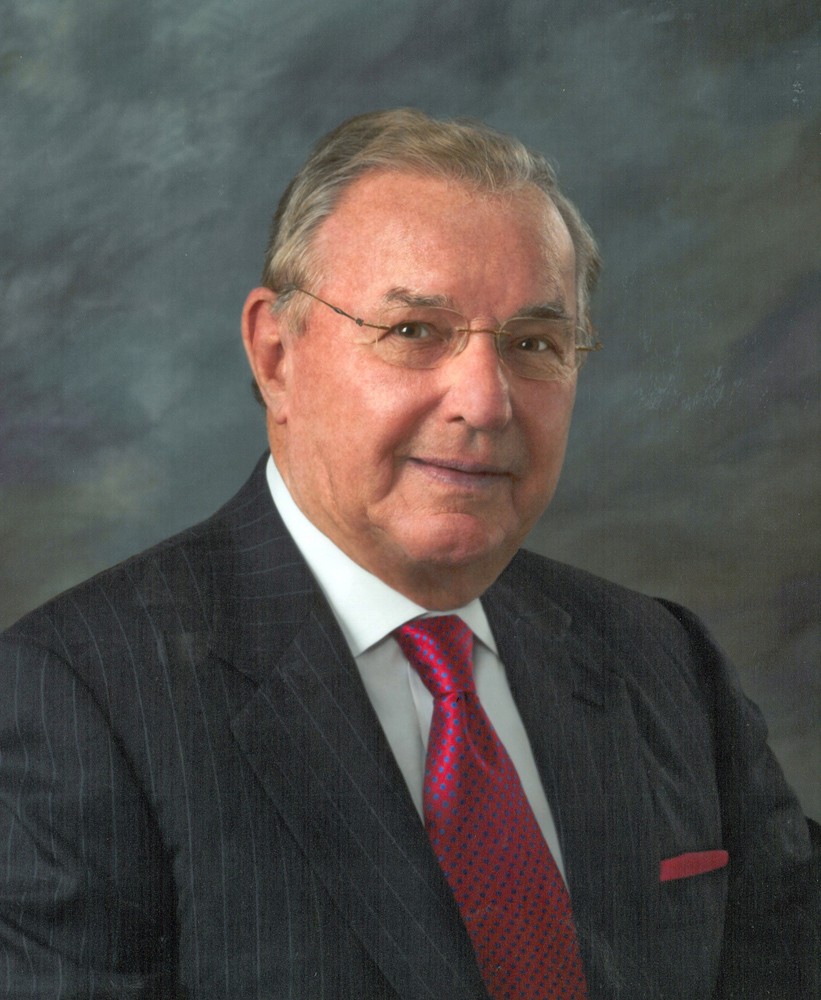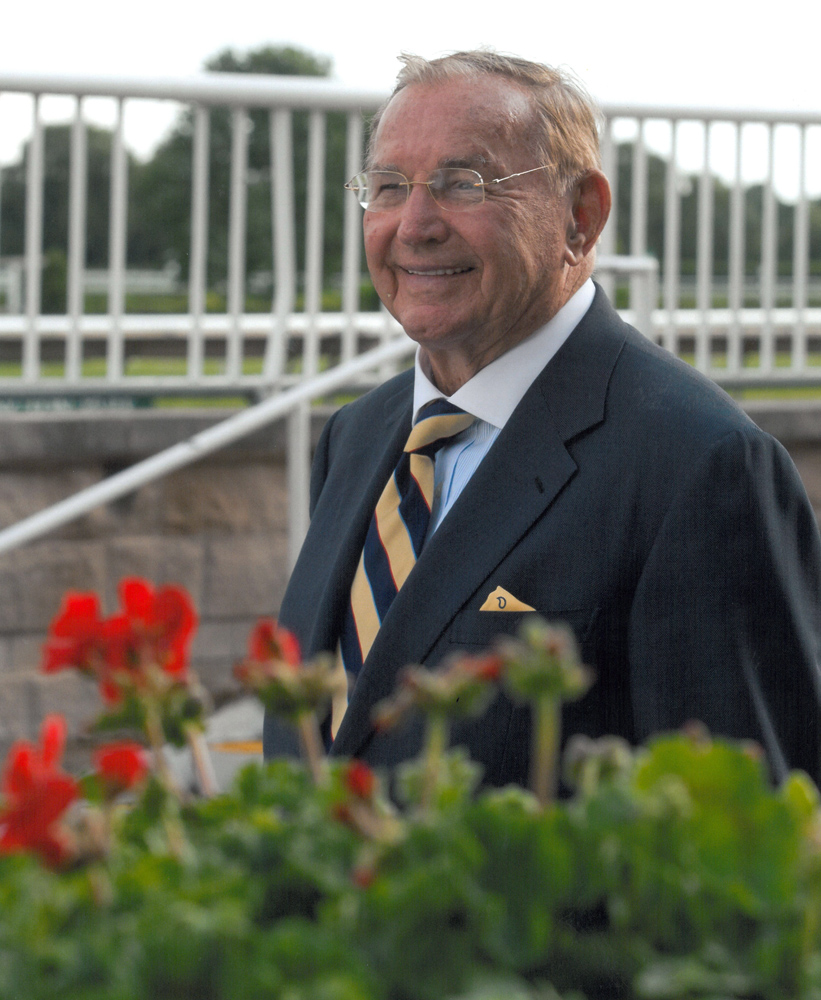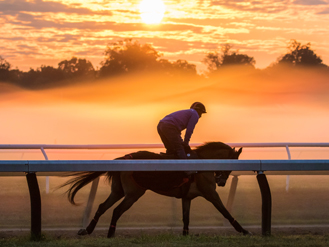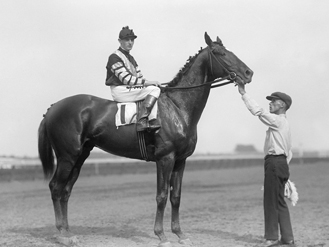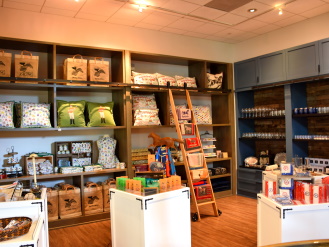Richard L. "Dick" Duchossois
It’s not often one compares a military operation to running a thoroughbred racetrack. In the case of Richard Duchossois, a Chicagoan born in 1921, the discipline and leadership skills he learned at military academy prep school and in the U.S. Army — where during World War II he landed at Utah Beach, saw action at the Battle of the Bulge, and led a tank division — is what made him the miracle worker at Arlington Park.
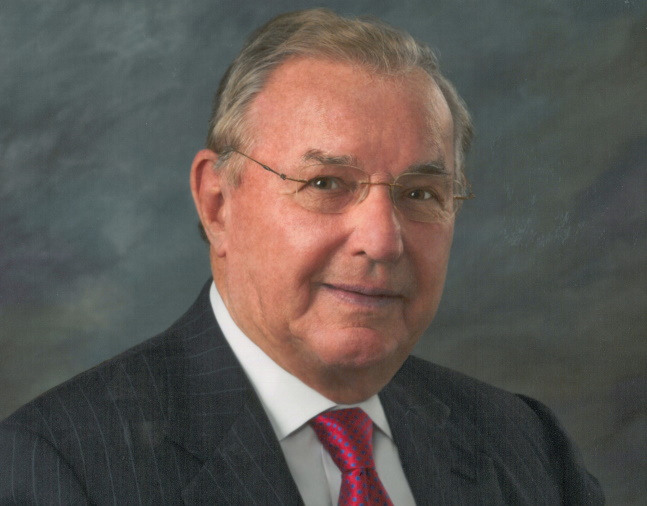
2019
Oct. 7, 1921, Chicago, Illinois
Jan. 28, 2022, Barrington Hills, Illinois
Biography
It’s not often one compares a military operation to running a thoroughbred racetrack. In the case of Richard Duchossois, a Chicagoan born in 1921, the discipline and leadership skills he learned at military academy prep school and in the U.S. Army — where during World War II he landed at Utah Beach, saw action at the Battle of the Bulge, and led a tank division — is what made him the miracle worker at Arlington Park.
While his accomplishments in business were voluminous, and his contributions to horse racing significant, the heart of Duchossois’ legacy in thoroughbred racing stems from a devastating fire on July 31, 1985, that destroyed the Arlington Turf Club just weeks before the scheduled running of the vaunted Arlington Million. And while he had already staked millions of his wealth into Arlington ownership, Duchossois was finally pressed into full service on behalf of the racetrack that owes its international prominence to him.
“The damage was profound," Duchossois said, and jeopardized plans for the upcoming Arlington Million, the park’s signature race and the thoroughbred industry’s first $1 million event when it started in 1981. The Million attracted famed horses such as John Henry as well as thoroughbreds from as far away as England. With the race just 25 days away, national TV broadcasters and sponsors threatened to pull the plug, said Duchossois, who insisted that the race would go on,’’ wrote Shia Kapos in Crain’s Chicago Business.
No people or horses were hurt in the 1985 calamity, and in the fire Duchossois saw how a Phoenix could rise from the ashes at Arlington. His post-military career had been about building businesses into juggernauts, including Thrall Car Manufacturing, a company that became the second-largest builder of rail freight cars under Duchossois management.
From there, he bought out the Thrall family and founded the multi-billion-dollar Duchossois Group, an organization with varying holdings from the technology and service sectors. But horse racing is another field in which Duchossois’ vision and management acumen served him and the industry well. He can command just about anything, including a racetrack that was up in flames.
“By then it was blazing and everybody was running around saying, ‘Oh, we can’t let the grand old lady burn,’ Duchossois told The BloodHorse. “My feeling was, I hope it goes all the way to the ground. Because at that point in time, when I saw it, there was absolutely no way you could rebuild the track like that without having it been a rebuilt, burned-out structure. It just couldn’t be done. We would be continuing an old, worn-out mode of doing business, instead of building new in the modern-day style.”
The man who commanded a tank division and won Bronze Stars, Purple Hearts, and other military honors in World War II took control. Duchossois who had staked $18 million when he bought the track in 1983 — spent $1 million to clear the destroyed clubhouse, laid pavement, and erected tents and bleachers so the race could go off. And it did, with 35,651 fans in attendance and acclaim for a stellar race, propelling Duchossois to rebuild Arlington in a style that would cater to a wider audience, especially women. The 700,000-square-foot clubhouse and grandstand opened in June 1989.
It was a solid, steady-eye ride for Duchossois, whose first foray into horse racing came in the 1960s, when he and his first wife, Beverly, bought a show horse for their son, then established a farm, before Beverly passed away in 1980. The couple by then had four children.
By the late 1970s, with his breeding and racing operation underway, Duchossois helped form the Illinois Thoroughbred Breeders and Owners Association. His rise to the top of Illinois horse breeding ranks coincided with a legislative push for more pro-racing laws from the state’s General Assembly. And it was during a fateful trip to the Kentucky Derby where he was enlisted to join a syndicate to buy Arlington, of which he wound up owning 85 percent.
“First of all, this all started when my son took an interest in hunters and jumpers, so I had no real desire to get involved in horse racing. Well, after my first wife passed away, I took a trip down to the Kentucky Derby, and by the fifth race, I was talked into being part of a syndicate to buy Arlington Park. I said, 'OK, I’ll do 10 percent,' and went back to Illinois and didn’t think about it until the day of the closing,’’ Duchossois said. “Turns out no one else had the money, so I had to go down to the closing with a check. We had the famous $1 million race, and the track got a lot of good international attention because of the purse. If we had not bought the track that would have killed racing in Illinois and that’s not what we wanted.’’
In 1998, Duchossois closed Arlington to grapple with a way to kickstart a new era in the track’s business. In 2000, he invested $200 million more in a fan-friendly new facility at Arlington and became a prominent owner of Churchill Downs stock, bringing Arlington Park under the fabled Kentucky track’s auspices. At the age of 97, Duchossois retired in the spring of 2019 from the board of directors of parent company Churchill Downs, Inc.
Duchossois was deeply respected as a businessman, executive, philanthropist, and a transformational figure in thoroughbred racing. It may have started out as mere curiosity, since Duchossois said he had no real love or deep interest in horses prior to his maiden trip to the Kentucky Derby in 1983. It was there he was talked into taking a minor stake in Arlington, only to have to fork over the entire $18 million because he was the only one with the cash.
The sport has both benefitted from and recognized the contributions of Duchossois. In 1985, Arlington became the first track to win the Special Eclipse Award because of the “Miracle Million. Duchossois was individually honored with a Special Eclipse Award in 1989 and the Eclipse Award of Merit in 2003. Arlington played host to the Breeders’ Cup in 2002, and the Arlington International Festival of Racing developed into one of the top draws of elite foreign horses to America each year.
A member of The Jockey Club, Duchossois served many organizations in the sport, including the National Museum of Racing and Hall of Fame and the Thoroughbred Racing Associations. He was awarded The Jockey Club’s Gold Medal in 1986, a Special Sovereign Award from The Jockey Club of Canada in 1988, and the Lord Derby Award in Great Britain, also in 1988.
Duchossois celebated his 100th birthday in 2021. He died on Jan. 28, 2002.
Achievements
Eclipse Award of Merit — 2003
Lord Derby Award — 1988
Special Sovereign Award — 1988
Media
